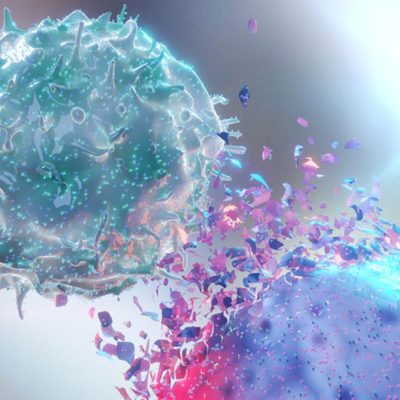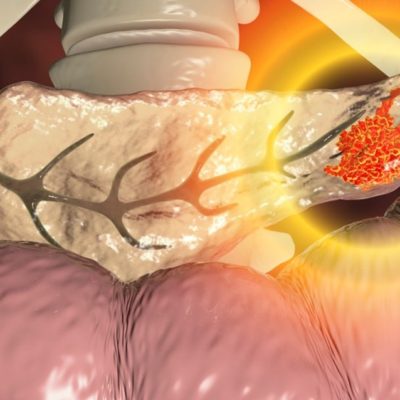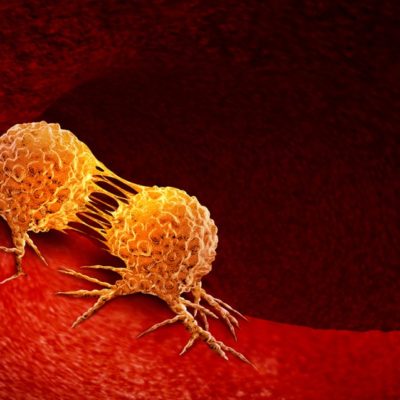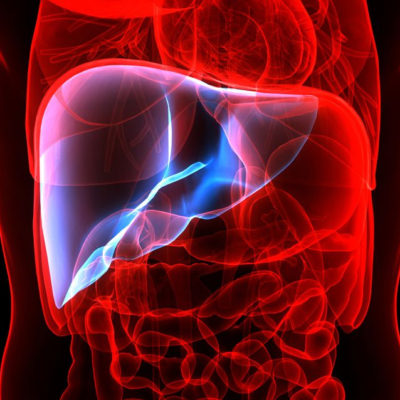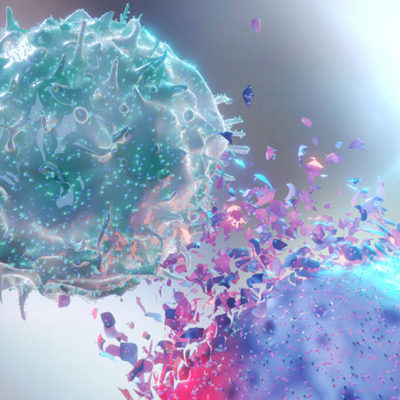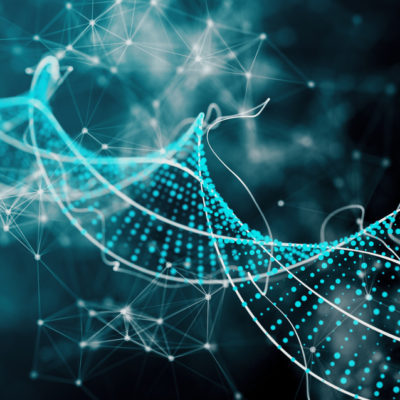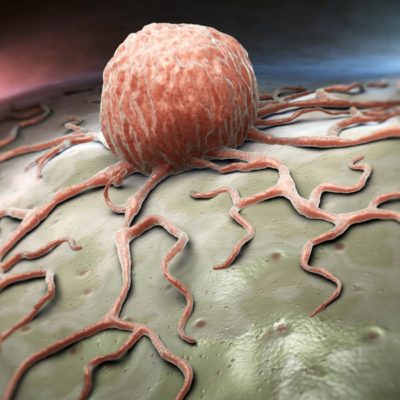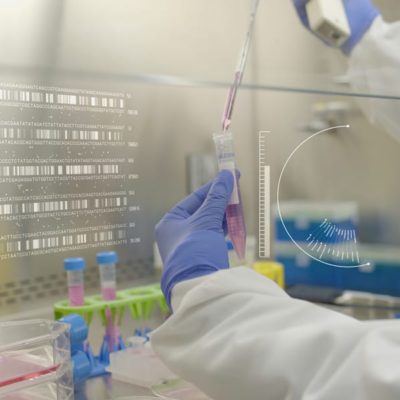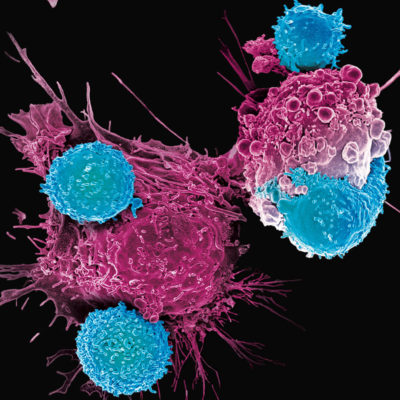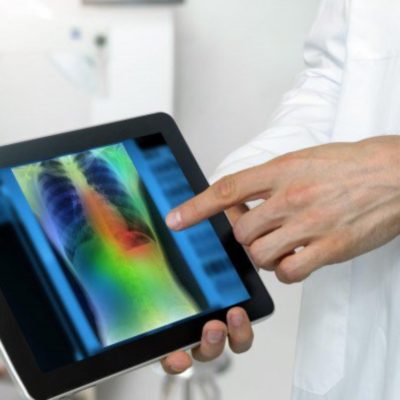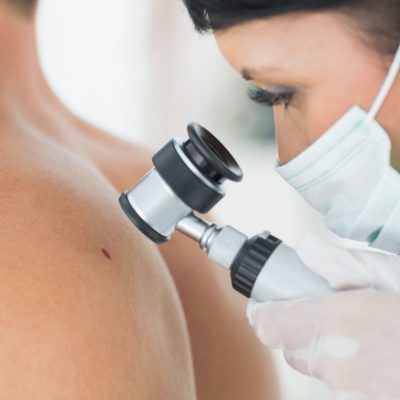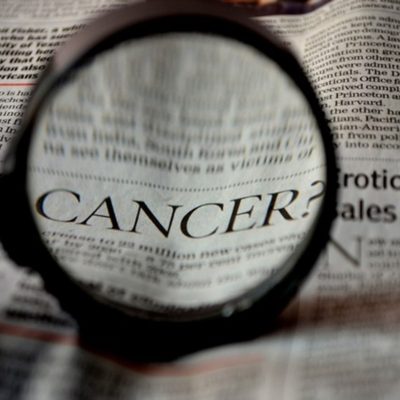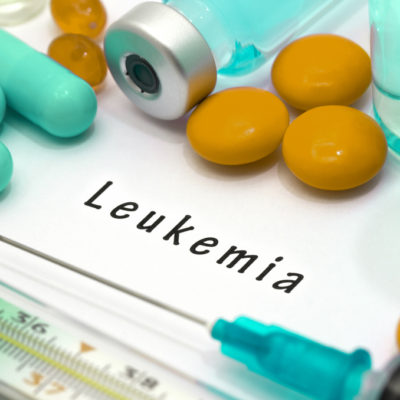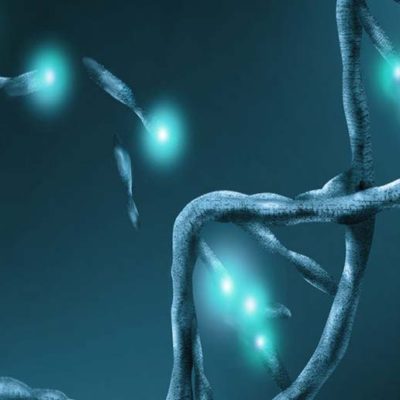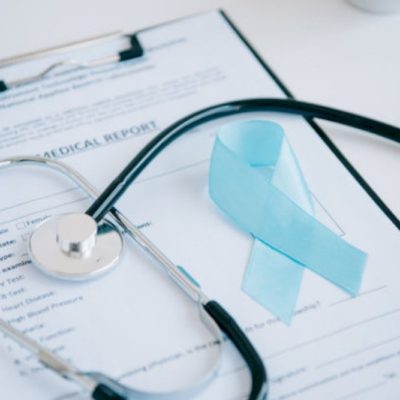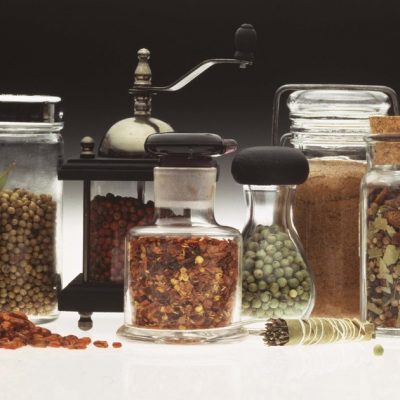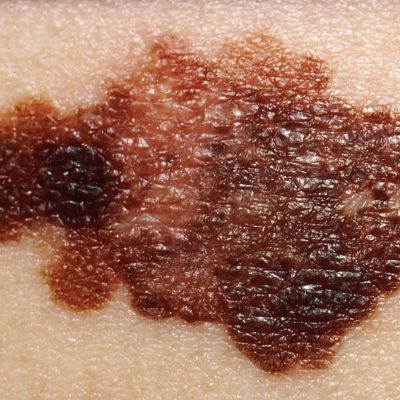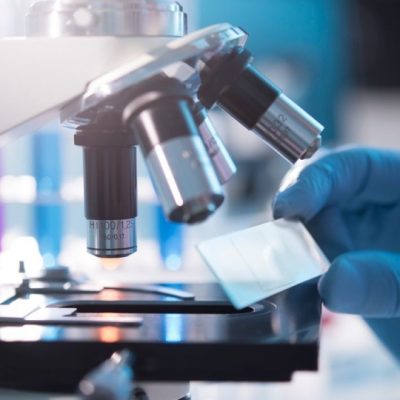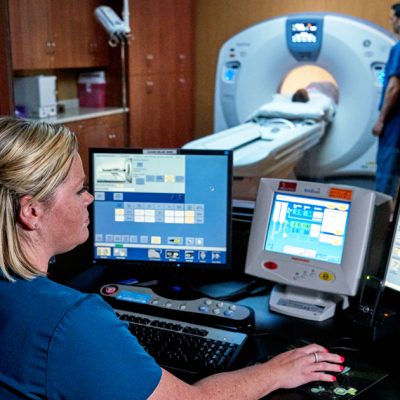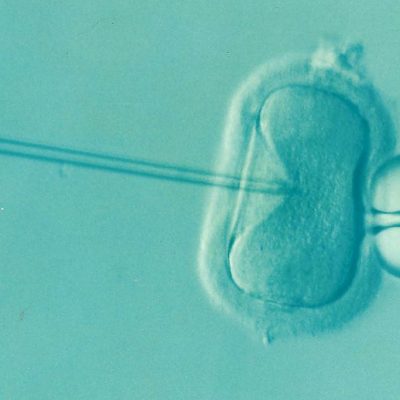An Iowa State University research team has discovered a method for modifying the function of an enzyme crucial to fat production, which could lead to more effective treatments for childhood obesity and cancer. While the research was in fruit fly larvae, being able to speed up or slow down lipid metabolism could have significant implications for human health, said Hua Bai, … [Read more...]
Cancer

Dietary Change Starves Cancer Cells, Overcoming Treatment Resistance
Cancer cells need nutrients to survive and grow. One of the most important nutrient sensing molecules in a cell is called mTORC1. Often called a master regulator of cell growth, it allows cells to sense different nutrients and thereby grow and proliferate. When nutrients are limited, cells dial down nutrient sensing cascade and turn off mTORC1. While mTORC1 is known to be … [Read more...]
Biological Pathways Provide Evidence For How to Overcome Barriers Limiting Cancer Immunotherapies
Researchers at UNC Lineberger Comprehensive Cancer Center have found a possible way to overcome barriers that block effective anti-cancer immune responses, thereby opening the potential for more effective immunotherapies in people. The findings are published in Nature. An unfavorable immune environment immediately surrounding a tumor cell is a major obstacle in using … [Read more...]
Researchers Find Tumor Microbiome Interactions may Identify New Approaches for Pancreatic Cancer Treatment
Investigators from Rutgers Cancer Institute of New Jersey, the state's leading cancer center and only National Cancer Institute-Designated Comprehensive Cancer Center, together with RWJBarnabas Health, examined the microbiome of pancreatic tumors and identified particular microorganisms at single cell resolution that are associated with inflammation and with poor survival. … [Read more...]
Scientists are One Step Closer to Stopping Drug-Resistant Tumors From Growing
Scientists have solved a long-standing mystery surrounding a cancer-promoting protein and how it causes tumor growth. The findings are an important step in the quest to make cancer drugs more effective since aggressive tumors often become adept at resisting drugs and other therapeutic agents. The recent discovery by a team of scientists including Benjamin Myers, PhD, an … [Read more...]
Leisure Time Activities may Lower Risk of Death for Older Adults
Older adults who participate weekly in many different types of leisure time activities, such as walking for exercise, jogging, swimming laps, or playing tennis, may have a lower risk of death from any cause, as well as death from cardiovascular disease and cancer, according to a new study led by researchers at the National Cancer Institute, part of the National Institutes of … [Read more...]
Scientists Discover Key to Hepatitis A virus Replication, Show Drug Effectiveness
The viral replication cycle is crucial for a virus to spread inside the body and cause disease. Focusing on that cycle in the hepatitis A virus (HAV), UNC School of Medicine scientists discovered that replication requires specific interactions between the human protein ZCCHC14 and a group of enzymes called TENT4 poly(A) polymerases. They also found that the oral compound RG7834 … [Read more...]
How Immunotherapy Changes Tumors
Johns Hopkins University engineers are the first to use a non-invasive optical probe to understand the complex changes in tumors after immunotherapy, a treatment that harnesses the immune system to fight cancer. Their method combines detailed mapping of the biochemical composition of tumors with machine learning. "Immunotherapy really works like magic and has fundamentally … [Read more...]
Scientists identify new therapeutic target in ovarian cancer subtype with poor prognosis
Mutations in the ARID1A gene are present in more than 50% of ovarian clear cell carcinomas (OCCC), for which effective treatments are lacking. Scientists at The Wistar Institute discovered that loss of ARID1A function enhances a cellular stress response pathway that promotes survival of cancer cells, which become sensitive to pharmacological inhibition of this pathway. These … [Read more...]
Japanese Knotweed extract could cut cancer risk of processed meat
Bacon could be back on the menu of health-conscious diners thanks to an unlikely salvation: Japanese knotweed. The fast-growing plant, feared by homeowners for its ability to invade gardens and buildings, contains a chemical which could take the place of the nitrite preservative in cured meats such as bacon and sausages. Diets high in nitrite have been linked to a … [Read more...]
Potential role of ‘junk DNA’ Sequence in Aging, Cancer
The human body is essentially made up of trillions of living cells. It ages as its cells age, which happens when those cells eventually stop replicating and dividing. Scientists have long known that genes influence how cells age and how long humans live, but how that works exactly remains unclear. Findings from a new study led by researchers at Washington State University have … [Read more...]
Parkinson’s, Cancer, Type 2 Diabetes Share a Key Element That Drives Disease
When cells are stressed, chemical alarms go off, setting in motion a flurry of activity that protects the cell's most important players. During the rush, a protein called Parkin hurries to protect the mitochondria, the power stations that generate energy for the cell. Now Salk researchers have discovered a direct link between a master sensor of cell stress and Parkin itself. … [Read more...]
Artificial Intelligence Could ‘Crack The Language of Cancer and Alzheimer’s’
Powerful algorithms used by Netflix, Amazon and Facebook can 'predict' the biological language of cancer and neurodegenerative diseases like Alzheimer's, scientists have found. Big data produced during decades of research was fed into a computer language model to see if artificial intelligence can make more advanced discoveries than humans. Academics based at St John's … [Read more...]
Bacteria may Aid Anti-Cancer Immune Response
Cancer immunotherapy may get a boost from an unexpected direction: bacteria residing within tumor cells. In a new study published in Nature, researchers at the Weizmann Institute of Science and their collaborators have discovered that the immune system "sees" these bacteria and shown they can be harnessed to provoke an immune reaction against the tumor. The study may also help … [Read more...]
Future of Immunotherapy could be ‘off-the-shelf’ treatments
In a new commentary for the journal Science, an associate vice president for research at The University of Texas at Arlington argues that emerging protein-based immunotherapy could lead to highly effective "off-the-shelf" cancer treatments for more patients. Jon Weidanz, who also is a professor in the College of Nursing and Health Innovation at UTA, is the author of a … [Read more...]
Deep Vision: Near-infrared imaging and machine learning can identify hidden tumors
Tumors can be damaging to surrounding blood vessels and tissues even if they're benign. If they're malignant, they're aggressive and sneaky, and often irrevocably damaging. In the latter case, early detection is key to treatment and recovery. But such detection can sometimes require advanced imaging technology, beyond what is available commercially today. For instance, some … [Read more...]
Injection to treat skin cancer developed
Yale researchers are developing a skin cancer treatment that involves injecting nanoparticles into the tumor, killing cancer cells with a two-pronged approach, as a potential alternative to surgery. The results are published in the Proceedings of the National Academy of Sciences. "For a lot of patients, treating skin cancer is much more involved than it would be if there … [Read more...]
Technology shines the light on ovarian cancer treatments
Scientists estimate that nearly 60% of all cancer patients do not respond effectively to chemotherapy treatments. Even worse -- many of those same patients experience toxic and sometimes deadly side effects. Now, a Purdue University scientist and entrepreneur is working to use simple LED light to help determine if certain chemotherapy options will work for specific … [Read more...]
Targeted Drug found Effective in Patients who have Lung Cancer with Certain Mutations
A targeted therapy called capmatinib can provide significant benefits to patients who have advanced lung cancer with specific gene mutations, according to recently published results from a phase two clinical trial. The trial, which is published in the New England Journal of Medicine, was conducted by an international team led by investigators at Massachusetts General Hospital … [Read more...]
Researcher seeks safer, more effective leukemia treatment
A potentially safer, more effective chemotherapy treatment for patients with blood-related cancers, such as leukemia, who need a particular bone marrow transplant procedure is under study at the University of Arizona Health Sciences. The procedure is known as a haploidentical (half-matched) bone marrow transplantation, or "haplo-BMT," providng an alternative source of stem … [Read more...]
Brake on immune activity identified, raising new possibilities for anticancer therapy
The immune system is like a carefully regulated machine, complete with its own built-in "brakes" that prevent it from overreacting and causing excess inflammation in otherwise healthy tissues. This preventative safety net, however, is highly vulnerable, particularly in cancer, where tumor cells step on the brakes constantly, because doing so allows the tumor cells to … [Read more...]
Cancer mortality continues steady decline, driven by progress against lung cancer
The cancer death rate declined by 29% from 1991 to 2017, including a 2.2% drop from 2016 to 2017, the largest single-year drop in cancer mortality ever reported. The news comes from Cancer Statistics, 2020, the latest edition of the American Cancer Society's annual report on cancer rates and trends. The steady 26-year decline in overall cancer mortality is driven by … [Read more...]
Stressing cancer with spice
A new study by scientists in Japan and Indonesia reports how an experimental drug agent stops cancer cells from growing. A little over a decade ago, Indonesian scientists first reported pentagamavumon-1 (PGV-1), an analogue of a molecule found in turmeric and that has been since discovered to have anti-cancer effects. In the new study, tests on cancer cells and animals reveal … [Read more...]
B cells linked to immunotherapy for melanoma
Immunotherapy is a form of cancer treatment that uses the body's own immune system to recognise and fight the disease. It comes in a variety of forms, including cancer vaccines, targeted antibodies or tumour-infecting viruses. Only some cancer patients currently benefit from this kind of therapy. In the case of melanoma, which is a particularly aggressive form of skin cancer, … [Read more...]
Tiny bubbles in our body could fight cancer better than chemo
Healthy cells in our body release nano-sized bubbles that transfer genetic material such as DNA and RNA to other cells. It's your DNA that stores the important information necessary for RNA to produce proteins and make sure they act accordingly. These bubbly extracellular vesicles could become mini treatment transporters, carrying a combination of therapeutic drugs and genes … [Read more...]
Study finds key metabolic changes in patients with chemotherapy-associated cardiotoxicity
More and more patients are being treated successfully for cancer. However, some cancer treatments that are very effective for breast cancer -- medications like anthracyclines and trastuzumab -- can cause heart dysfunction and lead to heart failure. Heart-related side effects can limit the amount of cancer therapy that patients are eligible to receive. Currently, there is no … [Read more...]
‘Seeing the light’ behind radiation therapy
Delivering just the right dose of radiation for cancer patients is a delicate balance in their treatment regime. However, in a new study from UBC Okanagan and Duke University, researchers have developed a system they say may improve the ability to maximize radiation doses to cancer tissues while minimizing exposure to healthy ones. "Radiation is a significant part of cancer … [Read more...]
Cancers ‘change spots’ to avoid immunotherapy
Cancers can make themselves harder for new immunotherapies to see by 'changing their spots' -- and switching off a key molecule on the surface of cells that is otherwise recognised by treatment. Researchers found that they could test samples from patients with bowel cancer to identify which were most likely to respond to immunotherapy by assessing molecular changes … [Read more...]
Largest Study of Childhood Cancer After IVF
In the past three decades, in vitro fertilization (IVF) has gone from an experimental procedure to being more common. Pregnancies enabled by IVF frequently have more difficulties, with children born earlier and smaller even among singleton births. University of Minnesota researchers conducted the largest study of childhood cancer after conception by IVF to date. This … [Read more...]
Increased Muscle Mass Improves Response to Cancer Treatment
As far back as Ancient Greece, a sculptured physique has been heralded as the pinnacle of physical perfection. But now, researchers from Japan have found that increased muscle mass doesn't just make you look good, it could literally save your life. In a study published in Scientific Reports, researchers from Osaka University have revealed that sarcopenia, or the loss of … [Read more...]
- « Previous Page
- 1
- 2
- 3
- 4
- …
- 38
- Next Page »


